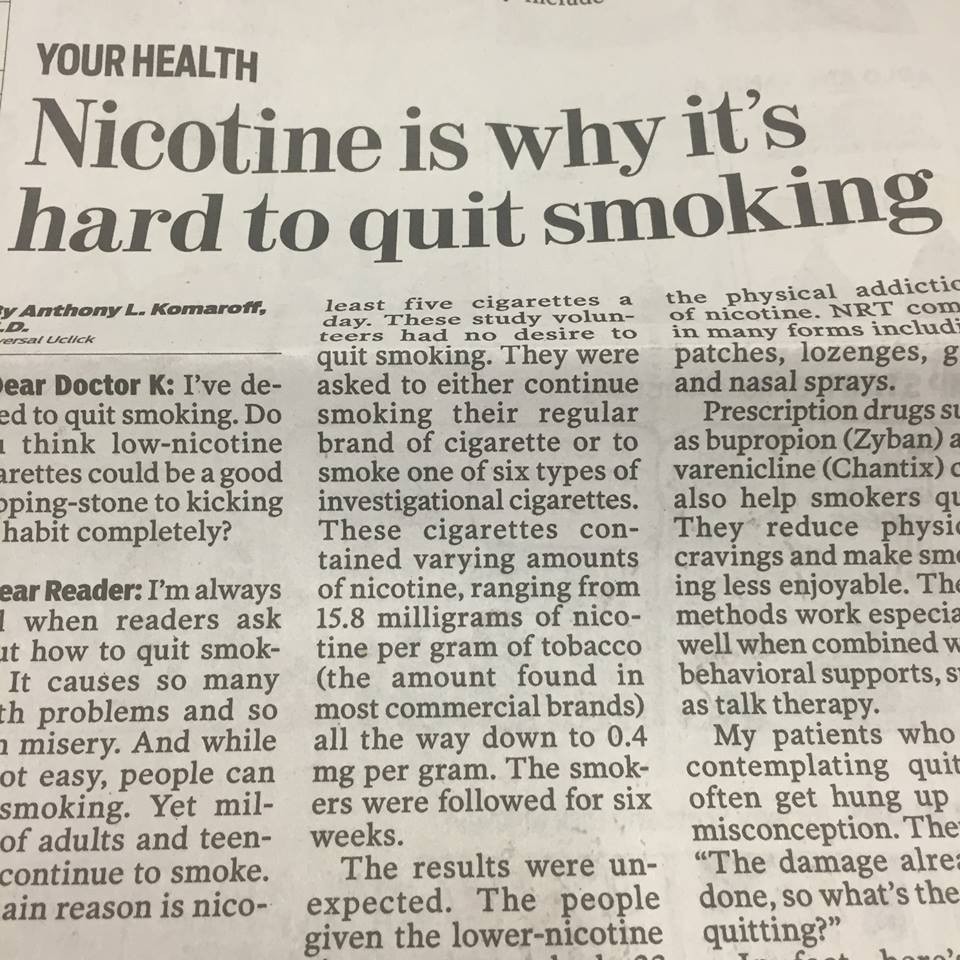As a social media expert, Carrie Brown-Smith has seen just about everything the internet has to offer — trolls, racists, ranters, flamers — you name it. But it was a comment from a Midtown neighbor on Nextdoor.com that broke her social-media pain threshold.
“This woman compared homeless people to stray cats,” Brown-Smith said. “I participate in a lot of social media, and I usually have a pretty high threshold, but this … I just couldn’t believe that this person would compare a homeless person to a stray cat in this neighborhood. It was so bad that I just couldn’t stand it anymore. So, I sort of stopped using [Nextdoor] regularly.”
Don’t get the wrong idea. Brown-Smith isn’t some pearl-clutching internet granny posting puppy pictures and inspirational memes. She’s a seasoned, thick-skinned social-media maven. She left Memphis in 2014 to lead the new social media journalism program at the City University of New York. So, even she was surprised that something said on social media could make her avert her eyes.
It’s the kind of thing that sometimes happens on Nextdoor, just as it does on almost any social media site. The difference is that on Nextdoor home, real names, and neighborhood residency must be confirmed by the site before anyone can join. These people are real, you know where they live, and, they still don’t hesitate to, well, compare a homeless person to a stray cat in front of the whole neighborhood.
Brown-Smith is quick to add that Nextdoor (or any other social media site) isn’t to blame. Social media sites are tools, she said, and “we bring to [them] all of the same biases and prejudices and human behaviors that we use when we’re interacting face to face.”
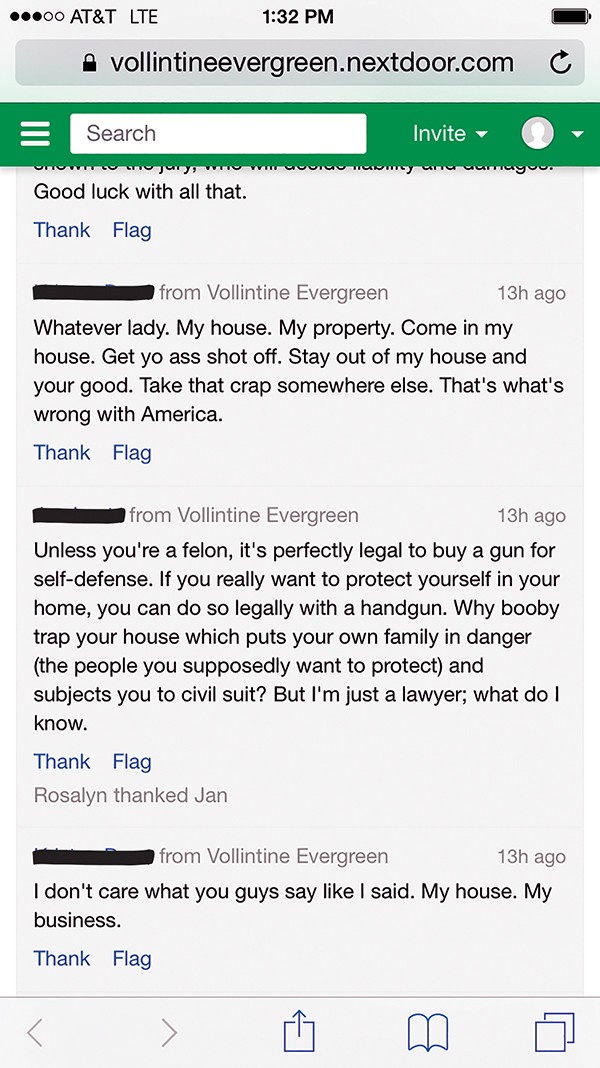
Founded in 2010, Nextdoor is a relative newcomer compared to Facebook (founded in 2004) or Twitter (launched in 2006), and it still has some growing up to do. It’s doing just that. Last month, the company issued new guidelines on racial profiling, a topic so pervasive on the network in Memphis that it’s widely understood that in many instances “suspicious person” is code for “black male.”
But Nextdoor, like Memphis itself, also has a lot going for it. Nextdoor is the place where you can ask your neighbors if they know a good car repair shop, a great barbecue place, or the best bank. It’s the place where you help your neighbors find lost dogs, tell them about an issue at city hall, or give them advice on lawn care. It’s the place where your neighbors will sell you just about anything: washing machines, shoes, furniture, tools, toilets, arts and crafts, an Uzbekistan folding hat, or duck eggs.
Or leave just about anything out on the street and issue a “curb alert.”
East Buntyn was Nextdoor’s pioneer neighborhood in Memphis, back in 2011. Now, nearly 300 neighborhoods (about 70 percent of all Memphis neighborhoods) are connected to the site, according to Jennifer Burke, a Nextdoor spokesperson. The company wouldn’t release total membership numbers, but Burke said the figure has doubled in Memphis over the last year.
“It’s something that Memphis residents have quickly adopted,” Burke said. “I think that’s a reflection of the fact that Memphis has tight-knit communities already, and Nextdoor is a platform that allows them to connect even more easily.”
The Memphis and Shelby County Office of Planning and Development (OPD) began to use Nextdoor last year to connect to the entire Memphis Nextdoor network. Using the site, the office broadcasts the upcoming cases before the Board of Adjustment and Land Use Control Board, which make decisions on real neighborhood-level issues, like where a new gas station can be built or if an alley can be closed.
OPD director Josh Whitehead says his office once used two neighborhood association email lists to get the word out. He says OPD now e-blasts on Nextdoor.com and reaches about 40,000 people.
“We found that many neighborhood associations were not being properly notified through [the previous] system,” Whitehead said. “Nextdoor has helped fill a gap in neighborhood notification of pending land-use cases.”
Brown-Smith said she thought the Nextdoor network in her new Jersey City neighborhood would be vastly different from the one she left in Memphis, but it’s “remarkably similar,” she said, even though there’s “super weird stuff” like people nursing pigeons back to health and an ongoing battle between people who like children in restaurants and those who don’t.
As an academic, she wondered about the long-term effects of Nextdoor. “Are we building more social capital?” Brown-Smith wonders. “Because we now know our neighbors better, does that mean we can all work together for better schools or all the great things that can happen when people come together. Or, is [Nextdoor] going to become more polarizing and make us feel more disconnected with our neighbors?”
While pondering Nextdoor’s future, we took an anecdotal look at the present. Flyer staff writers found their favorite stories from the social media site and spoke to some of those involved. These are their stories (DUN-DUN). — Toby Sells
Trashy Hot Tubbin’ (Central Gardens)
One Saturday night last December, my wife, Laura Jean Hocking, and I were returning from Project Motion’s holiday dance show, when we saw the thing in the street.
It was a tangle of brown foam insulation and plumbing. At first, Laura thought our house had exploded, but it turned out to be a jacuzzi tub that had been ripped from its installation and left sitting in the street. We discovered it was filled with what appeared to be trash from a roofing job: old shingles, hundreds of nails, and big bags of various household debris. After poking it with a stick to be sure there wasn’t a dead body in it, we called the cops to report an illegal dumping incident.
The officer who responded was the model of professionalism and friendliness. “I got the call about a hot tub in the street, and I thought, a tub of boiling water? In the street?” she said. “Then I saw it and said, yeah, that’s a hot tub in the middle of the street.”
At her order, we moved the heavy tub and its halo of garbage to the curb as best we could, and she told us to call waste management first thing Monday morning and have it removed.
The next morning, Laura posted our story on Nextdoor Central Gardens. She said we had nothing to do with the traffic-blocking agglomeration of unlikely objects, and she felt it was important that the online guardians of neighborhood virtue understood that the situation was being handled.
Ten years ago, we wouldn’t have done anything to notify anyone. Five years ago we would have posted the news on Facebook and hoped we were friends with enough neighbors. Nowadays, misdemeanor hot-tub dumping is a job for Nextdoor.
On Wednesday, Laura got a call from Jason Miles, a reporter at WMC-TV. He had read about the now-infamous hot tub on Nextdoor and wanted to know if it was still there. Assured that it was, he asked if we would talk on camera about our experience. Soon I was holding a microphone and yelling “Come get your crap!” at the faceless scofflaws who illicitly deposited a bathing apparatus in a public right-of-way.
Once Miles got his shots, he called the city for comment. Before the segment aired, a city crew arrived with a crane to haul away the offending jacuzzi. As I was thanking the public servant in charge, she said she thought it was our hot tub she was hauling away.
“Oh no!” I said. “Check Nextdoor!”
So what did we learn? That we actually care about what the people on Nextdoor think about us, and that local news is more powerful than social media. Also, I got to say “crap” on television.
— Chris McCoy



Coyote Ugly (Central Gardens)
Midtowners, you need to hide your cats and hide your chickens, because the elusive Midtown coyote is on the loose.
At least, that’s according to Central Gardens resident Toby Cole, who made the following post on Nextdoor in January: “Last night around 10:30, I saw a coyote walking east down Central west of Willett. He was just strolling along and turned into one of the streets between Melrose and Willett.”
A little background is in order for non-Midtown residents. Coyote sightings around Midtown over the years — in the Central Gardens neighborhood and Overton Park — have become the stuff of urban legend. At least one coyote was captured in Midtown in 2010, and wildlife officials have said there are likely several coyotes living in the area. But Midtowners tend to refer to the collective coyotes as “the Midtown coyote.”
“Anyone still have their ‘I saw the Midtown coyote in Central Gardens’ T-shirt from the early ’90s?” one Nextdoor commenter asked.
What happened next was typical Nextdoor chatter: Someone suggested people should keep their cats inside, and a couple of folks hinted that responsible pet owners should never let their cats out.
Said one commenter (all errors their own): “For some reason people think it’s. Alright to let cats run loose. Just because they have been going out for years & nothing. Well in this century, if they get into fight they can easily get Leukemia & aids. Lots do & its heartbreaking plus cars & especially evil kids & adults think it’s so much to torture a cat. If you actually car about your pets, you won’t let them run loose.”
Central Gardens resident Joey McPeak said his cat had been acting weird lately, “like she’s seen a ghost or something,” and hadn’t wanted to go outside much. He also warned Midtowners to “keep an eye on your chickens if you have any.”
Interviewed later by the Flyer, McPeak revealed that he’s pretty certain his last cat became prey for a coyote.
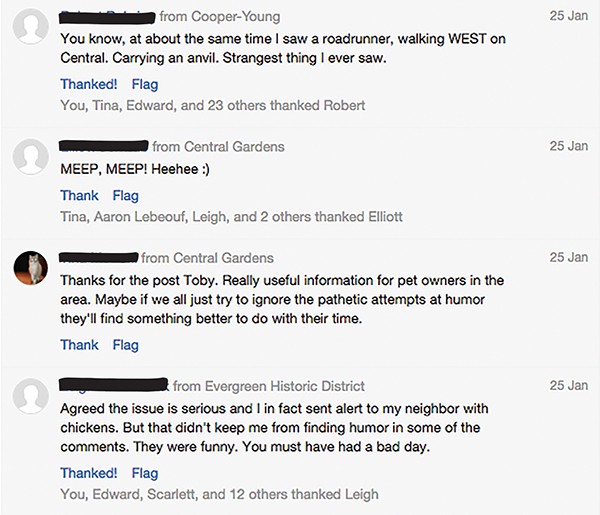
“We had a cat before this one named Newton, and he was killed by the Midtown coyote. He had this really wiry gray fur under his claws, and I found him on the sidewalk. It was very sad. The next day, our neighbors’ cat was mauled by the Midtown coyote,” McPeak said.
On the thread, which went on for several days, others said they, too, had spotted a coyote. Someone posted an article about aggressive coyotes in Northern California being high on ‘shrooms with the comment, “It could be worse. We could have trippin’ coyotes.”
While the thread was highly entertaining, it did accomplish what the original poster, Toby Cole, intended. Cole told the Flyer “When we had trouble before with coyotes, in the ’90s, there was one killing people’s small dogs and cats. This time, I just went on Nextdoor to let people know it was out there.” — Bianca Phillips
Painting Yellow, Seeing Red (Mud Island)
What would you do if, after a long day at work, you returned home to discover your beautiful park-like neighborhood had been covertly transformed into an enormous Walmart parking lot? Not an actual Walmart parking lot, mind you. But imagine your neighborhood turned into something so tacky it merits fair comparison to the retail giant.
If you live on Mud Island and are a part of Nextdoor’s Uptown community, chances are you know exactly how it feels, and have stated keen displeasure on a thread titled, “Welcome to your Walmart parking lot … I mean home.”
The “Welcome” thread was posted December 10, 2015, after the city of Memphis “deemed it necessary to paint a huge, double yellow line down the middle of Island Place,” making the street exactly like a Walmart parking lot, somehow.

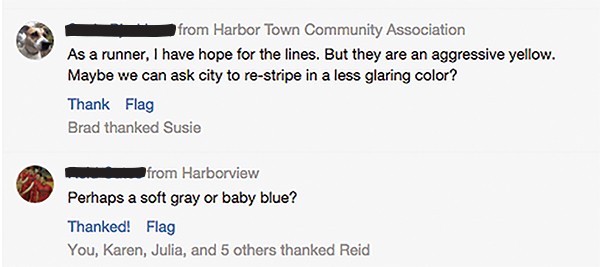
Many Mud Islanders were “disgusted” by the “aggressive” yellowness of the paint. According to one critic, “the workmanship is just hideous.” One self-identified runner said she was hopeful that the lines might turn out to be a good thing for the neighborhood, which had experienced problems with speeders and parking, but she wondered if a “less glaring” color might be substituted. Someone else helpfully suggested a “soft gray or baby blue” might be preferable.
Many of the original respondents to the “Welcome” thread said they’ve grown accustomed to their new normal, though nobody seems to like it. Others remain angry and think the online service helps to keep people from becoming complacent with changes that are so clearly against the wishes of the homeowners association.
David Tobin, a Mud Islander of nine years, says the problem on Island Place goes back at least five years before the striping, when he was calling the police every day to complain about speeders.
“We’ve got people driving into houses and people hitting cars,” he said. Then one morning last June, Tobin left his house for work and noticed a crew preparing to stripe the road.
“I was disgusted,” he said, describing the event that turned him into an activist. “I parked my car in the middle of the road. I was like, ‘I don’t have time to go back and get my cheaper car that they can just run over. I’m parking the Mercedes right in the middle of the road. And I’m not moving.”
He did have to move eventually, however, and in December, while Tobin was working out of town, the city crews returned. He sees the move as a breakdown of local government.
“If you’ve got a speeding problem and you want to fix it, you can do bump-outs or speed bumps or put up speed limit signs,” Tobin said. “Or, you can paint lines on the road. What do you think the city did?”
They painted paradise — and made it a parking lot. — Chris Davis
Suspicious Minds (Avon)
Jay Purdue could not have known that when he sent his “suspicious person” alert on Nextdoor that he, himself, would be targeted by another vigilant Nextdoor neighbor as a person of suspicion.
Purdue was driving his daughter to a friend’s house one Friday night, when he saw a man walking down a street (not the sidewalk) of his leafy Avon neighborhood. He walked slowly, Purdue said, looking into the windows of the cars parked on the street.
To make one thing perfectly clear, it was the man’s behavior — not his race — that Purdue said merited his listing in the “suspicious person” category.
“You can tell when when someone is on their way somewhere and walking with a purpose, versus someone who is just poking around looking into driveways,” Purdue said.
Purdue watched the man for a while and then drove away. Then he remembered the Nextdoor app on his phone. He pulled quickly to the curb, pulled out his phone, tapped an alert, and zapped his message to hundreds of his surrounding neighbors. When he got home, Purdue checked the app again to see if anyone had responded to his post. What he found puzzled him, frightened him a bit, and then made him laugh. Another alert — sent only moments after his — reported a suspicious vehicle: a black Honda with tinted windows.
The alert said the car had “pulled quickly up to the curb in front of our house, frightening my daughter who went running to her friend’s house next door.”
“As I read it, I realized she was talking about me,” Purdue said.
He admits he was little worried at first, wondering if someone would recognize his car from the post and call the cops. Then, he realized the whole thing was “hilarious” and quickly replied to the post, explaining his erratic behavior. — TS
Taking the “Lead” (Central Gardens)
The Nextdoor network utilizes neighborhood residents known as “leads,” who are responsible for monitoring posts on the site. Duties include removing offensive or deliberately provocative posts and posters, and basically serving as referee when discussions get heated. Tracy Wiswall is a Nextdoor lead for the Central Gardens neighborhood.
Flyer: When did you become a lead?
Wiswall: I joined Nextdoor in October 2013 and became a lead the next month. I saw the potential benefits for crime and safety monitoring right away. When I started there were around 50 members in the Central Gardens group. Now we’re at around 1,600 members. That’s one of the best parts of being a lead — seeing that growth.
What are some of the biggest benefits of the site?
Nextdoor is different than most other social networks in that you’re dealing with people who are around you in real life. It’s unlike Facebook or other sites where you might have contacts from around the country or the world. On Nextdoor, you’re all dealing with the same real-life issues, and it’s very transparent; you know who everyone is.
What’s the most difficult thing you’ve had to deal with?
Well, there have been plenty of controversial posts, and it’s difficult knowing where to draw the line between allowing a difference of opinion and taking it too far, making it too personal. And you have to stay vigilant. People try to hack into the site with a fake name or address, so you have to check new users.
What’s the most beneficial thing about Nextdoor?
Crime and safety, I think. Having more people in the know about criminal activities is always better. Also the sharing of recommendations for plumbers, electricians, etc. is great. I like knowing that the recommendation is coming from a neighbor who’s actually had work done by the service person.
What’s the most popular subject?
Pet stuff might be the No. 1 most-discussed topic: strays, found animals, lost pets.
What’s been the funniest post?
To me, the funniest one was when the police caught a criminal that one of our members had caught on video. When he was arrested, he was wearing the same clothes, and when police asked the guy to take his hands out of pockets, two laptops fell out of his jacket. The comments were really funny on that one. That, and the guy who posted a “curb alert” for the Ole Miss football season after the Memphis game. — Bruce VanWyngarden

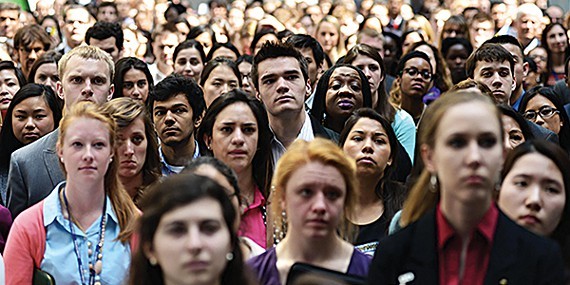







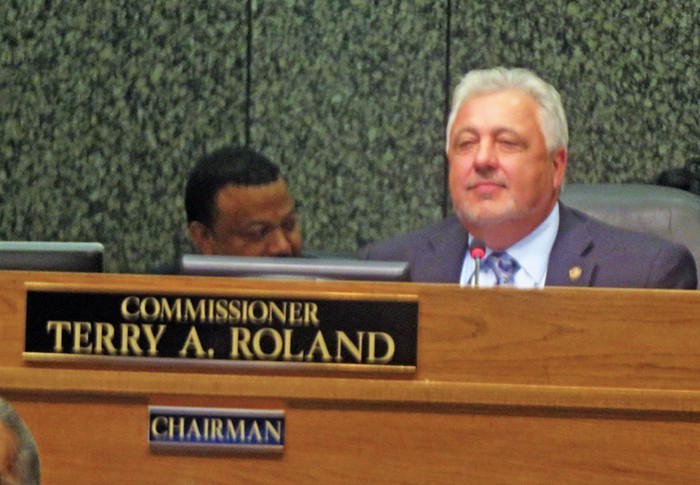
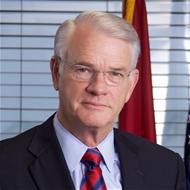

 Memphis Pets Alive
Memphis Pets Alive 